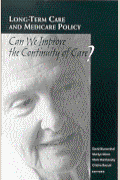As the population ages, policymakers must evaluate the nation’s readiness to assist a growing group of people with conditions requiring chronic and long-term care. Based on the 2002 annual meeting of the National Academy of Social Insurance, this new volume offers a variety of viewpoints from policymakers, researchers, and experts who examine how well the needs of the elderly and disabled Americans are being met by today’s financing and delivery systems, in light of potential reform options. Particular attention is paid to care coordination issues—namely, the impact of acute-care policies on long-term and chronic care—to draw attention to how the segmentation of healthcare provision can create disruptions in patient care. Authors address the advantages and disadvantages of varying levels of state, federal, and private involvement in long-term care. Clearly, for people to access appropriate long-term care today and tomorrow, a careful balance of financing sources and integrated health care must be achieved. Researchers, analysts, and policymakers, therefore, will find this volume useful to informing thoughtful analysis of important long-term care issues.
David Blumenthal is director of the Institute of Health Policy and a physician at the Massachusetts General Hospital/Partners Health Care System. Marilyn Moon is a senior fellow at the Urban Institute. Mark Warshawsky is deputy assistant secretary for Economic Policy, Microeconomic Analysis, at the U.S. Department of the Treasury. Cristina Boccuti is a health policy analyst at the Urban Institute.


